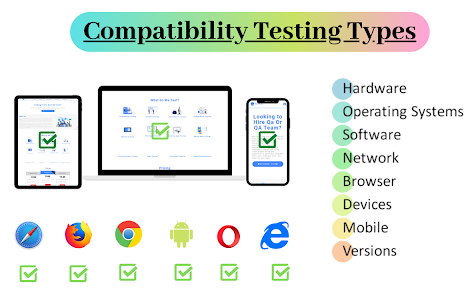Introduction
Digital products are widely used by users nowadays for almost every chore of their lives. These products are being used on different kinds of devices having different operating systems, specifications, and screen sizes. To make sure these products work perfectly on every other device, they are always tested for their compatibility with these devices. This point elaborates on the importance of compatibility testing. Products having better compatibility with devices work perfectly on every other device and checking this compatibility is super important for companies. In this blog, we will shed light on compatibility testing, its types, and the importance of compatibility testing. So be with me to broaden your knowledge.
What is Compatibility Testing?
We can clearly understand the importance of compatibility testing if we first understand what is compatibility testing itself. So let’s learn about it first and then move ahead to explore further stuff. Whenever digital products are made, they are made to be run perfectly on different devices with different features, operating systems, and screen sizes. To make sure these products work perfectly on all devices, they are tested thoroughly with a testing technique called compatibility testing. The importance of compatibility testing can easily be assessed with this aspect that without checking the compatibility of products, they can show issues in working on devices having different specifications. Now let’s move towards exploring other things like compatibility testing benefits and types.
Types of Compatibility Testing

understanding compatibility testing, we are good at understanding why compatibility testing is important and what are its associated types. Following are some of the very famous types of compatibility testing:
Hardware Compatibility Testing
Compatibility testing of hardware can answer the question of why compatibility testing is important. This checks if the software works well with different hardware. It makes sure the software runs smoothly on different devices like desktops, laptops, or mobile phones. This helps avoid problems later. Hence hardware compatibility testing holds a special place in our application compatibility testing guide.
Operating System Compatibility Testing
The next testing that can answer why compatibility testing matters is compatibility testing of operating systems. This testing helps to test if the software works well on different operating systems like Windows, macOS, or Linux. It ensures that users with different systems can use the software without issues.
Browser Compatibility Testing
The next very important type of testing that can best answer the question of why your app needs compatibility testing is browser compatibility testing. This checks if the software or website works well across various web browsers like Chrome, Firefox, or Safari. It ensures that users get the same experience no matter which browser they use.
Network Compatibility Testing
Sometimes apps can show problems working with the internet. So whenever a question of why test application compatibility for a network, we answer it in a way that this type tests how the software performs in different network environments. It ensures that the software runs well whether the internet speed is fast, slow, or even when there is a poor connection.
Mobile Device Compatibility Testing
Apps are usually run on mobile phones and if someone asks why compatibility testing matters, we can say that it checks if the software works well on different mobile devices. It ensures that the software functions correctly on various screen sizes, resolutions, and operating systems like Android and iOS.
Software Compatibility Testing
One of the key reasons for compatibility testing is testing the compatibility of software. In this testing, we test if the software works well with other software. It checks that the software functions properly when used alongside other programs, ensuring a smooth user experience.
Database Compatibility Testing
We often come across a question about why compatibility testing is crucial and this question is then answered with database compatibility testing. In this testing type, we test if the software works well with different databases. It makes sure that the software can store and retrieve data correctly, no matter which database is used.
Benefits of Compatibility Testing

In this section of our blog, we will learn about the compatibility testing benefits. This testing not only tests your products to make sure they work perfectly on every device, but it also provides you with several other benefits. Following are some of the very important benefits of compatibility testing for apps and software:
Improved User Experience
Compatibility testing ensures that the software works smoothly across different devices, browsers, and systems. This leads to a better user experience, as users can enjoy the software without any problems. This is one of the most important benefits of compatibility testing for apps and software. So when the question arises of why compatibility testing is important, the provision of better user experience is the answer.
Increased Customer Satisfaction
So the next benefit capable of answering compatibility testing necessity is that it helps increase customer satisfaction. When software works well on various platforms, customers are happy. Compatibility testing helps avoid issues that could frustrate users, leading to higher customer satisfaction and loyalty.
Reduced Risk of Bugs
By testing software on different setups, compatibility testing helps identify and fix bugs before the software is released. This reduces the chances of problems occurring after launch, saving time and resources. A reduced amount of bugs can be a robust explanation of compatibility testing necessity. So one of the key reasons for compatibility testing is that it provides you with a reduced risk of bugs.
Wider Market Reach
In our application compatibility testing guide, the next benefit to discuss is the benefit of wider reach to the market. Software that is compatible with different systems can reach a broader audience. Compatibility testing helps ensure that more people can use the software, regardless of their device or operating system. The provision of better reach to the market can be the most viable answer to why test application compatibility.
Cost Savings
The next benefit that can easily answer why compatibility testing matters is that it can help companies like Siznam save their overall cost of testing. Finding and fixing compatibility issues early on can save money. It prevents costly fixes and updates after the software has been released, making the development process more efficient.
Better Performance
Compatibility testing ensures that the software performs well under different conditions. This leads to a smoother, more reliable experience for users, enhancing the overall quality of the software. So, assurance of better performance of products on different devices is the clear answer to why compatibility testing is crucial.
Compliance with Standards
The next benefit that comes in line to explain why your app needs compatibility testing is that it helps apps comply with industry standards. Testing for compatibility helps ensure that the software meets industry standards and regulations. This can protect the company from legal issues and maintain its reputation.
Conclusion
Digital products are used on different kinds of devices which can vary from each other in different aspects like operating systems, specifications, screen sizes, and many more. So to make sure an app works perfectly on every device, compatibility testing is performed. The question of why compatibility testing matters can be answered by a large number of its benefits given above. So a reliable company that provides the best compatibility testing for your products is Siznam.
People Also Ask
Application compatibility ensures that a software application can function correctly across various devices, operating systems, and browsers. This is crucial because it enables users to access and use the application without issues, providing a consistent experience and helping to reach a broader audience.
The aim of compatibility testing is to verify that an application performs as expected across different platforms, devices, operating systems, network environments, and browsers. This testing helps identify and resolve compatibility issues, ensuring optimal performance and user satisfaction.
Application compatibility testing is a type of testing that assesses whether an application is fully functional across different hardware, software environments, and configurations. It involves testing the application against various operating systems, browsers, devices, and network settings to identify compatibility issues.
A compatibility test checks for application performance, functionality, and appearance across different environments. It examines factors like operating systems, devices, screen resolutions, browsers, and network conditions to ensure that the application provides a seamless experience across all supported platforms.






